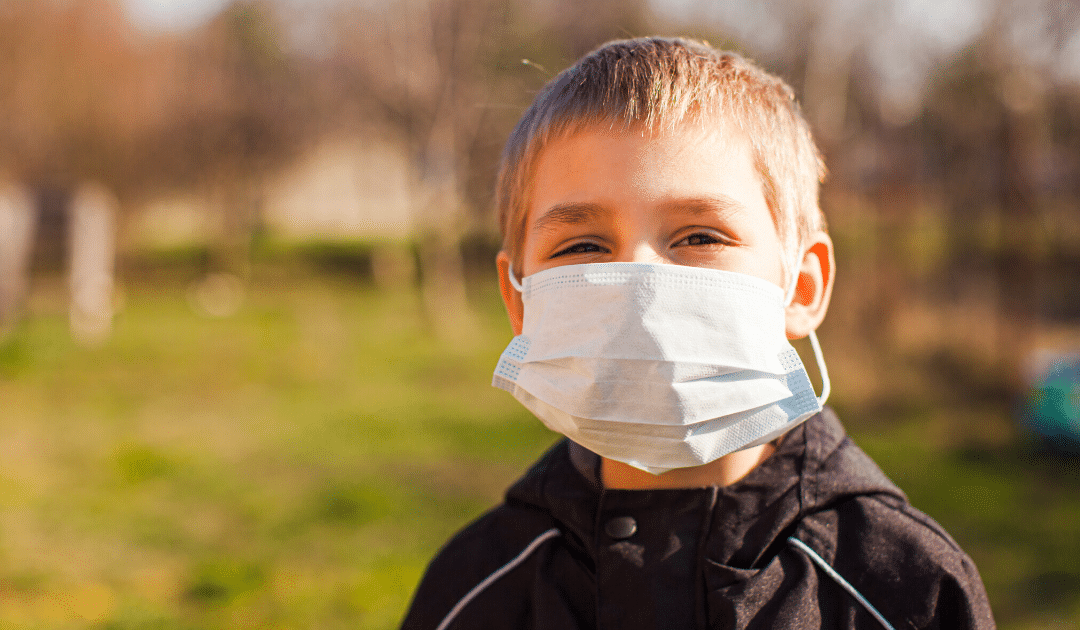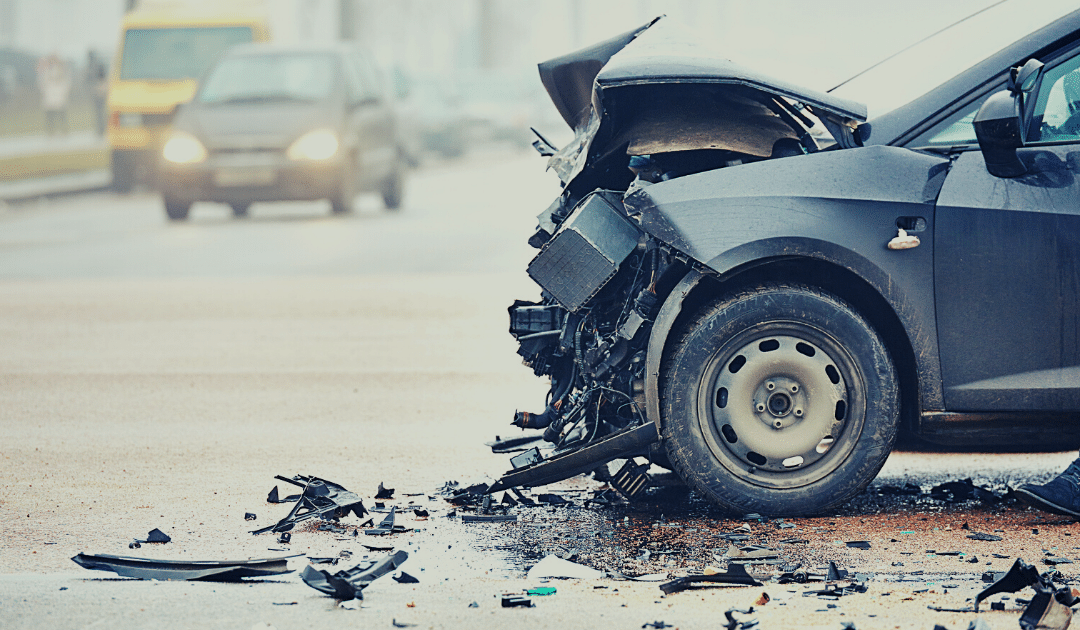
by California Casualty | Educators, Safety |
No one knows what the upcoming school year will look like, thanks to coronavirus. What we do know, however, is that teachers and educational support professionals will need to be prepared for any scenario — schooling in person, hybrid classrooms, online learning, staggered scheduling, rotating teacher shifts, and more.
While there may not be much that you can control right now, you can do your best to prepare for the fall by reviewing what we already know about COVID-19 and applying that knowledge to your classroom plans.
If your school makes the decision to resume in-person classes, here are some guidelines issued by the CDC for schools (last updated May 19, 2020) and how you can prepare for them in the fall.
Social Distancing
The more time a student or staff member interacts with another, the higher the chance of contracting or passing on the virus. By now, we all know that that the term “social distancing” means staying at least 6 feet apart from one another, however, this may not be possible in your classroom. Before you get back into your classroom, take some time to consider ways that you can optimize your space by separating student desks, and workspaces the farthest that you can away from one another.
Respiratory Etiquette
It’s important for children to learn to sneeze and cough into their elbows, to help fight the spread of germs, including the virus that causes COVID-19. It is also important that hygiene supplies are placed close to each student, so that the potential virus spread is limited. Consider having multiple tissue stations placed around the room or have each child bring their own box that they can keep at their desk.
Face Masks
More and more cities are requiring face masks, and that may be the case for classrooms in the fall, especially for staff and older students. If masks become mandatory at your school you can either require students to bring their own, or make it fun and announce a mask theme for your entire class. You and students could even make your own and create a story around them. Remember this whole situation is just as hard on students as it is on adults; small actions like this have the potential to make their day a little brighter.
Health & Safety Messaging
The CDC recommends placing signs in highly visible areas, like entrances and restrooms, and your school may also require you to place them in your classroom. Pinterest has all kinds of hygiene posters that are free to print out and hang up! They also have hygiene lessons that teachers can easily incorporate into their lesson plans, to help remind younger students about the safety and importance of not spreading the virus.
Hand Hygiene
Students should wash their hands often for at least 20 seconds — especially if they have interacted with one another. When you sit down to lesson plan, keep in mind allowing time for more frequent and longer breaks to the restroom for handwashing. You should also have sanitizer (at least 60% ethanol or 70% isopropanol) in multiple places in the room, readily available for all students, and/or ask students to bring their own.
Adequate Supplies
Along with having the correct sanitary supplies, you should also be prepared for the possibility that students will not be able to share school supplies with other students. Any crayons, markers, pencils, scissors, folders, books, etc. that are shared might have to be available to each student at their own desks. Take this into consideration when you are preparing supply lists for parents and when you are buying supplies for your classroom.
Cleaning & Disinfecting
If you are starting in-person classes in the fall, your school has also probably already started a cleaning and disinfecting regimen that will continue throughout the year. This may or may not require you to clean your own classroom; however, you should be prepared to do so. You will need to disinfect high-touch areas throughout the day like doorknobs, desks, hall-passes, and chairs. Try and disinfect as often as you can — between classes and at the end of the day — or create a schedule where the last ten minutes of class each student disinfects their own area.
Screening & Testing
As testing methods and standards continue to evolve, your school may adopt a screening and testing policy. Policies may include a protocol for temperature checks, guidelines for symptom screenings, and plans for rapid response to staff or students who exhibit signs of illness. Whatever protocol your school decides on, clear communications will be key to its success. Be prepared to stay informed on the plan, take steps outlined for educators, and communicate with parents as needed.
We may not know what this school year will look like, but we do know that our amazing teachers will do whatever they can to make it as enjoyable and “normal” as they can for our students.
Remember, if you can get through last spring, you can get through anything. Bring on back-to-school!
This article is furnished by California Casualty, providing auto and home insurance to educators, law enforcement officers, firefighters, and nurses. Get a quote at 1.866.704.8614 or www.calcas.com.

by California Casualty | Auto Insurance Info, Safety |
Less traffic has been hitting the roads, but cities and states across the country are actually seeing an increase in accidents- in adults and in teens. Fatal accidents involving teenagers has already hit an all-time high. Preliminary data from The National Safety Council indicates a 14% increase nationwide in fatal miles driven in the spring of 2020, compared to 2019.
While many people across the country stay inside and continue their “new normal” – working from home and only leaving the house when necessary, drivers on the less crowded roadways may be prone to take advantage of open lanes of traffic by driving recklessly, resulting in fatal accidents.
States all across the country have experienced increases in roadway deaths including California, Arkansas, Connecticut, Illinois, Louisiana, Nevada, New York, North Carolina, Oklahoma, Tennessee, and Texas.
If you have to get back on the road, follow these safety tips to avoid a deadly collision.
Brush Up on Traffic Rules & Regulations
It’s never a bad idea to re-familiarize yourself with traffic laws, especially if it’s been a while since you’ve been behind the wheel. Before you get back on the road, take some time to go over basic traffic rules and regulations for your state, and minimize the risk of getting in an accident.
Don’t Speed
Speeding is a bad habit that most of us are guilty of, and when traffic is light the urge to speed increases (especially on the interstate). Not only is speeding against the law, but it also makes the road extremely dangerous for everyone on it. Speeding alone causes over 100,000 deaths every year. With clear roadways during the pandemic, more drivers are speeding to get to their destination causing fatal accidents. Avoid injuring yourself and/or others, and don’t speed.
Drive Defensively
It’s more important than ever to stay alert and aware when you are on the road. Defensive driving is a set of driving skills that allow you to defend yourself against possible collisions caused by other drivers. These skills include: preparing to react to other drivers, avoiding distractions, and planning for the unexpected. You should always drive defensively, even if you are obeying all of the traffic laws, because other drivers may not be.
Watch Out For Pedestrians
In the early months of the pandemic, we saw more and more people turn to walking and biking for socially distant exercise, and many people have kept up with these healthy habits. When you are behind the wheel stay alert and keep an eye out for pedestrians that may be biking in streets or using crosswalks.
Educate Your Young Driver
Every May – September is considered the “100 Deadliest Days” for young drivers, as many hit the road for the first time (even during the pandemic). Teens are inexperienced behind the wheel, which makes them more susceptible to reckless and distracted driving – the number one killer of teens in America. Pair inexperience and reckless driving with an increase in fatal accidents and you have a recipe for disaster. Before your young driver gets behind the wheel this summer, educate them on following the rules of the road, even when there is no traffic. For more tips on teaching your teen driver click here.
Lastly, Make Sure You Have the Proper Coverage. Although this will not help you avoid a collision, it will save you time and money in the event you do get into an accident. While collision rates are on the rise, it’s important, now more than ever, to have the right auto insurance protection for when you get back on the road. This will not only help with out-of-pocket expenses due to an accident, but it will also give you peace of mind knowing that your insurance is one thing you don’t have to worry about during these trying and uncertain times.
Drive smart and stay safe. For more auto insurance tips click here.
This article is furnished by California Casualty, providing auto and home insurance to educators, law enforcement officers, firefighters, and nurses. Get a quote at 1.866.704.8614 or www.calcas.com.

by California Casualty | Auto Insurance Info, Safety |
Whether summer road trips beckon or you’re resuming more pre-quarantine activities, increased highway time with your tiny-passenger crew means revisiting best practices for safety.
Check out the following tips for keeping kids safe while in your ride. We’ve also gathered some strategies for keeping your car’s interior safe (and clean) from those same tiny passengers.
The Safety Basics
-
- Always use a car seat. Car seats are designed to protect children from injury or death during vehicle collisions, so choosing the right one and installing it properly tops the list. Check the car seat laws in your state here, and refer to the National Highway Traffic Safety Administration for an in-depth guide on car seats and booster seats.
- Activate child locks to prevent any dangerous mishaps with children accidentally opening doors.
- Use the window locks to keep children from playing with the controls and potentially getting their hand, arm or hair caught in a rolling window.
- Secure safety belts. If there are any unused, loose belts within arm’s reach of your child, secure them so there’s no chance of them becoming an entanglement hazard.
- Never leave a child alone in a car. Not even for a minute. From heat stroke and abduction risk to the possibility of a hit-and-run incident or your child getting loose in the car, the potential of harm is simply too great to chance it.
- Never leave your keys in the ignition or car. Ever-observant, your children have surely seen how you use your keys and, if afforded the chance, could try mimicking your actions.
- Use the back-up camera to avoid hitting children outside your vehicle who may be out of view.
More Child-Proofing
-
- Declutter the car. Any object can become a projectile in an accident, so make sure items are secure or stowed away. Keeping your car clean also decreases the risk of your child grabbing something that might be a choking hazard.
- Use sunshades to protect their delicate skin from harsh UV rays. You can find easy-to-use shades in a variety of shapes, sizes, and styles.
- In-car entertainment. The upside to living in the Age of Screens is that they’re a parent’s best friend in keeping kids distracted and entertained in the car.
- Never drive distracted. Not only does distracted driving endanger you and your children, it sets a bad example for their future driving habits. Eating, texting, inattention, and daydreaming all pull your focus away from the road. So does engaging with your kids in the back seat, which is all the more reason to get everyone set up and settled in before you pull out from the driveway.
- Maintain your vehicle to decrease the chances of overheating, breaking down or getting stranded.
Minimizing the “Mess Orbit” in Your Car
-
- Get a rug or a beach towel to protect underneath the car seat and along the entire seat’s length. It’s easy to remove, shake out, and throw in the washer.
- If you allow food in the car, only allow that which can be vacuumed up (i.e. nothing squishy, mushy or sticky). For liquids, water (in spill-proof cups) tops the list for easiest clean-up.
- Cover the backs of the driver and front passenger seats to protect them from dirty footprints.
- Put cupcake liners in the cupholders to catch those unreachable crumbs.
- Invest in a quality seat protector for leather seats that may become stressed by the car seat’s weight over time.
As with anything else that involves kids, creating habits and routines are often the key to success. When it comes to vehicle safety, adopting best-practice habits will keep your entire crew safer and happier on the road.
This article is furnished by California Casualty, providing auto and home insurance to educators, law enforcement officers, firefighters, and nurses. Get a quote at 1.866.704.8614 or www.calcas.com.

by California Casualty | News, Safety |
Every year, Independence Day is an opportunity for neighbors to come together to share a meal, catch up, enjoy each other’s company, and celebrate America’s independence. And for many, the evening wouldn’t be complete without fireworks.
A flipside of these celebrations can be disputes between neighbors — usually relating to fireworks and noise levels. Here are some ways to keep the peace and preserve your neighborhood’s sense of community this July 4th.
Whether you’re hosting at home, going to a neighbor’s house, or joining a block party, remember that neighborly respect, courtesy and kindness are key to preventing issues.
- Communicate with Your Neighbors
If you’ll be hosting a get-together, give your neighbors a heads up so they’re not taken by surprise. Remember to let them know when the party will end so they can know when to expect some quiet. If you and your family are the ones being kept awake by loud noise or neighbors past a reasonable hour, reach out in person instead of immediately calling the police. They may have lost track of the time or be unaware of how much the noise is carrying. The soft approach is often the best approach.
If you’re hosting a casual gathering, consider inviting your neighbors to stop by. A low-pressure, informal party is a perfect opportunity to get to know neighbors a little better — especially those whom you’ve only exchanged waves with while taking in the trash cans. Hanging out in the front yard or co-hosting a block party is another option to encourage visits and conversation.
Check out your city’s noise ordinance and do your best to abide by it. Many people work on July 5th and/or have young kids who need sleep, etc. so wrapping up parties and noise by the curfew will be greatly appreciated.
- Practice Fireworks Safety
If you’re thinking of purchasing fireworks, check your city or county government’s website first. Some areas, for reasons such as wildfire risk, ban all fireworks outright (even those that are legal in other cities). If you are in the clear, find a space that you can designate to light them. This area should be far away from anything that could quickly catch fire (i.e., yours and your neighbors’ houses, wooden fences, trees, and shrubs). Before the festivities start, be sure to read up on these firework safety practices.
If you had fireworks at your home, be sure to clean up all lit or unlit fireworks. For one, they are toxic to pets and animals; and two, many leave behind sharp fragments that can injure a barefoot or puncture a tire. If your family attended a block party in the neighborhood or went to a neighbor’s home to celebrate, stay a few minutes afterward and help clean up.
If we’ve learned anything during the pandemic, it’s that we’re not islands unto ourselves. We’re part of communities, neighborhoods, work families, and friend networks. Being considerate and inclusive of our neighbors this holiday is one more way to celebrate the American spirit.
This article is furnished by California Casualty, providing auto and home insurance to educators, law enforcement officers, firefighters, and nurses. Get a quote at 1.866.704.8614 or www.calcas.com.

by California Casualty | Safety |
In 2018, the U.S. Coast Guard counted 4,145 recreational boating accidents that caused 633 deaths. That’s a fatality rate of 5.3 deaths per 100,000 recreational vehicles. There were also just over 2,500 injuries and about $46 million dollars of property damage.
The weather’s beautiful. Your boat’s ready. The rivers, lakes, and shores are calling. We get it! But here’s a reminder to keep safety top of mind while enjoying excursions with friends and family.
Here are the top 6 causes of boating accidents, as reported by the U.S. Coast Guard.
- Alcohol
By far, the leading known contributor to accidents is alcohol use, which contributed to 19 percent of deaths. Remember that blood alcohol content laws are the same for drivers of cars and boats. Underage drinking laws and penalties also still apply. Alcohol use while boating can lead to reckless boating, excessive speed, and other avoidable risks.
- Operator Inattention
The boating vibe is definitely one of relaxation and fun. But it’s imperative that drivers remain attentive to their surroundings. Rocks, swimmers, submerged trees, floating debris, other watercraft and changing weather can quickly turn conditions hazardous.
- Improper Lookout
Besides the driver, every vessel must have an appointed lookout — someone who monitors for boat traffic; nearby vessels; and risks of collision, stranding and grounding. If anyone in the group is doing water sports, the lookout must alert nearby boats that someone’s in the water. Accidents in this category were due to there being no designated lookout or the lookout was not doing their job. For every boat trip, make sure you appoint someone and that they understand and fulfill their duties.
- Operator Inexperience
Safely operating a boat is not only about knowing how to drive and handle that specific vessel, but also knowing the relevant boating laws and regulations (including locale-specific rules). Boater education classes are a great first step to gain experience and know-how. Anyone driving a boat must also know how to handle emergency situations.
- Equipment Failure
Just as with cars, boats need regular maintenance, repairs, and upkeep. Make sure your boat is “water-ready” before taking it out for the season. This includes the engine and mechanical parts, as well as life preservers, flares, navigation lights, and other safety items. Do a test run of the safety equipment so you don’t have an unexpected failure out on the water.
- Excessive Speed
High speeds make debris, hazards, swimmers and other boats harder to see, and decreases reaction time. Be mindful of posted speed limits and speed laws, which should be followed at all times. Also, inexperienced drivers sometimes forget that boats don’t have brakes like cars, which can get them into trouble quickly in an emergency or unexpected situation.
Some Final Reminders…
Although related to the above top causes, we’d be remiss if we didn’t mention the following 4 boating risks to keep in mind.
-
- Busy Summer Days — Beautiful weather translates to crowded waters. More traffic means the driver and lookout must remain vigilant and attentive to hazards.
- Reckless Boating — This encompasses any risky or unsafe driving behavior, and exponentially increases with alcohol consumption and/or operator inattention and inexperience.
- Weather Conditions — Inclement weather such as strong winds, heavy rain, or sudden lightning is a hazard in itself but can also cause swells and large waves that threaten to capsize boats.
- Hydration —It’s easy to become dehydrated when out in the sun and the elements — and paradoxically, when surrounded by water. Remember to always have enough water on board and hydrate, hydrate, hydrate!
Many crashes can be avoided by knowing the risks and following safety guidelines. With precautions in place, you’ll have peace of mind to enjoy those beautiful summer days and sunsets on the water.
This article is furnished by California Casualty, providing auto and home insurance to educators, law enforcement officers, firefighters, and nurses. Get a quote at 1.866.704.8614 or www.calcas.com.

by California Casualty | Pets, Safety |
It’s that time of year again — time to light up the grill, gather family and friends and celebrate American Independence. If yours, your neighborhood’s or your city’s plans include fireworks, then there’s one group that won’t necessarily be in a celebratory mood: household pets.
Every year, July 5th is the busiest day at animal shelters across the country. They receive an influx of dogs and cats who fled their homes the night before, trying to escape the sound and explosions of fireworks. When scared and pumping adrenaline, pets can scale high fences and break loose from leashes and chains.
If your pet is scared of loud noises, take these precautions to ensure that they stay safe and sound this July 4th.
Before the Holiday
-
- If your pet is especially nervous, consult your veterinarian about tranquilizers or drugs that can help with anxiety. Talk with them about giving a “practice” dose of medication before the event to see how your pet responds.
- Work with an animal behaviorist or trainer. For some pets, positive reinforcement and behavior modification training around their fears can make all the difference.
- Make sure your pets’ ID tags are updated with your current contact information and that tags are securely affixed to their collar.
- Update their microchip registration and pet license information. If they aren’t yet chipped, this is a good opportunity to do so.
On July 4th
-
- Move them to a room and put on soothing music. Cover windows to minimize the sound and flashes of light.
- An anxiety vest — or even a snugly fitting t-shirt — could help calm them.
- If they are especially anxious, make sure someone checks in on them frequently. That person should act calm and reassuring — animals look to their humans to gauge danger.
- Noise anxiety is not as common with cats as it is with dogs, but it can happen. Cats tend to hide (very well) when scared, so make sure you check in on them too. Keeping them indoors (and in a room of their own) is a good idea.
- If for any reason your pet is outside during fireworks, keep them away from any lit fireworks, which can result in burns to the face, nose, lips, eyes, or inside of the mouth.
After the Festivities
Whether or not you ignited fireworks on your property, search your front and back yards for unignited fireworks or spent remnants. Remember that some may have landed in your yard from neighbors. Immediately remove any you find — fireworks contain many chemicals and heavy metals that are toxic to animals. Do a second cleaning sweep in the morning before letting animals access your yards.
If you’re not sure if your pet may have been exposed to or ingested fireworks — lit or unlit — watch for the following signs, which vary depending on the type and amount ingested. Contact your vet immediately.
-
- Abdominal Pain
- Vomiting
- Bloody diarrhea
- Seizures
- Tremors
- Shallow breathing
- Jaundice
- Acute kidney failure
Having a game plan to keep your pets safe during the holiday ensures that you won’t spend July 5th searching the streets and shelters. If your dog or cat could talk, they’d thank you for it.
This article is furnished by California Casualty, providing auto and home insurance to educators, law enforcement officers, firefighters, and nurses. Get a quote at 1.866.704.8614 or www.calcas.com.






